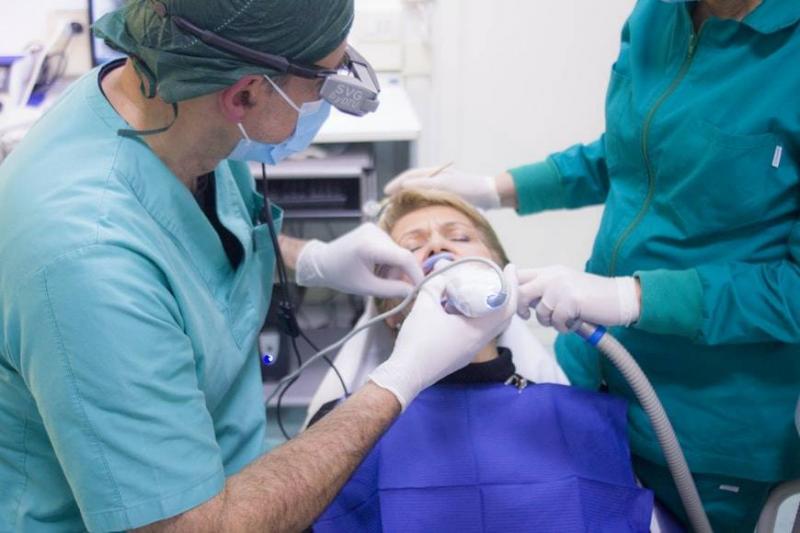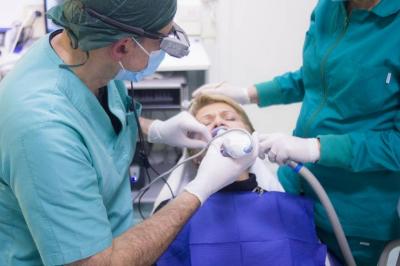No one likes going to the dentist; many of us fear our appointments, even if it's just for a cleaning. However, when your teeth suddenly start to hurt, the pain can be excruciating, and you'll be forced to go. In fact, researchers have found that there are unexpected reasons that can cause pain in your mouth, including infections, sinus issues, gum problems, and more. In this article, we will explore more surprising causes of tooth pain.
**Reason 1: Teeth Grinding at Night**
Teeth grinding, also known as bruxism, is when many people grind their teeth only at night, meaning they are unaware they're doing it. Some symptoms of bruxism include increased tooth sensitivity or pain; jaw, neck, or facial pain; and headaches.
**Reason 2: Gum Recession**
When gums start to wear away or recede from the teeth, it can lead to discomfort in the mouth. Gum recession is quite common, and one of the early signs is increased tooth sensitivity.
**Reason 3: Abscess**
A tooth abscess is a pocket of pus caused by a bacterial infection. Though there are several reasons for tooth abscesses, common symptoms include persistent severe pain, sensitivity to temperature, and discomfort while chewing. Other symptoms can include fever, swollen lymph nodes, and swelling in the cheek or face.
**Reason 4: Temporomandibular Joint Disorder (TMJ)**
TMJ disorders can cause pain in the jaw muscles and the joint. Some symptoms include jaw pain, ear pain, difficulty chewing, and soreness in the jaw joint.
**Reason 5: Sinus Problems**
Sinus inflammation can cause tooth pain, especially in the upper back teeth, which are close to the sinuses. Tooth pain is a common symptom associated with sinus issues. If your teeth hurt, it's advisable to visit a dentist first, even if the pain is related to sinus problems.
**Reason 6: Visiting the Dentist or Orthodontist**
Though we expect to feel better after having our teeth checked by a specialist, recent visits to the dentist are one of the most common causes of tooth pain. When dentists and orthodontists move teeth, it can make them susceptible to trauma and injury, which is why many people leave a dental chair feeling sensitive or sore.
**Reason 7: Gum Injury**
According to the National Institute of Dental and Craniofacial Research, common symptoms of gum disease include tooth sensitivity, receding gums, swollen or red gums, bleeding gums, pain while chewing, and persistent bad breath.
**Reason 8: Jaw Clenching**
Jaw clenching can cause pain and is another form of grinding, with similar symptoms. If you are clenching your jaw, you might feel pain in your muscles, ear discomfort, headaches, sensitivity to sugary foods and temperatures, and stress.
**Reason 9: Over-Brushing**
Everyone wants white, clean teeth, and in pursuit of this, some people over-brush. Excessive pressure while brushing can lead to problems and pain as it can damage the teeth's structure and cause gum recession that exposes the roots. To avoid excessive pressure that harms dental health, consider using an electric toothbrush or a very soft manual brush to protect tooth enamel.
**Reason 10: Over-Exercising**
If you overdo it with exercise, it can actually lead to dental issues. According to a study published in the Scandinavian Journal of Medicine and Science in Sports, athletes who excessively engage in endurance sports are more likely to experience dental erosion, such as enamel loss and increased cavities. Heavy breathing during exercise can mean less saliva production, allowing bacteria to flourish and cause cavities.
**When to Visit the Dentist**
If you have unexplained pain in your teeth or jaw, make an appointment with a dentist to assess what's going on.
**In Conclusion**
Tooth pain could be caused by a simple, easily treatable issue or something more complex, so it’s always best to take it seriously and visit a dental clinic for evaluation. If left untreated, some tooth pain and infections can lead to life-threatening concerns and spread throughout the body, causing larger infections. Keep up with your regular dental visits every six months (or more frequently if recommended by your dentist) to avoid these more severe scenarios. Engage in open and honest conversations with your dentist to maintain a pain-free oral health throughout your life.




